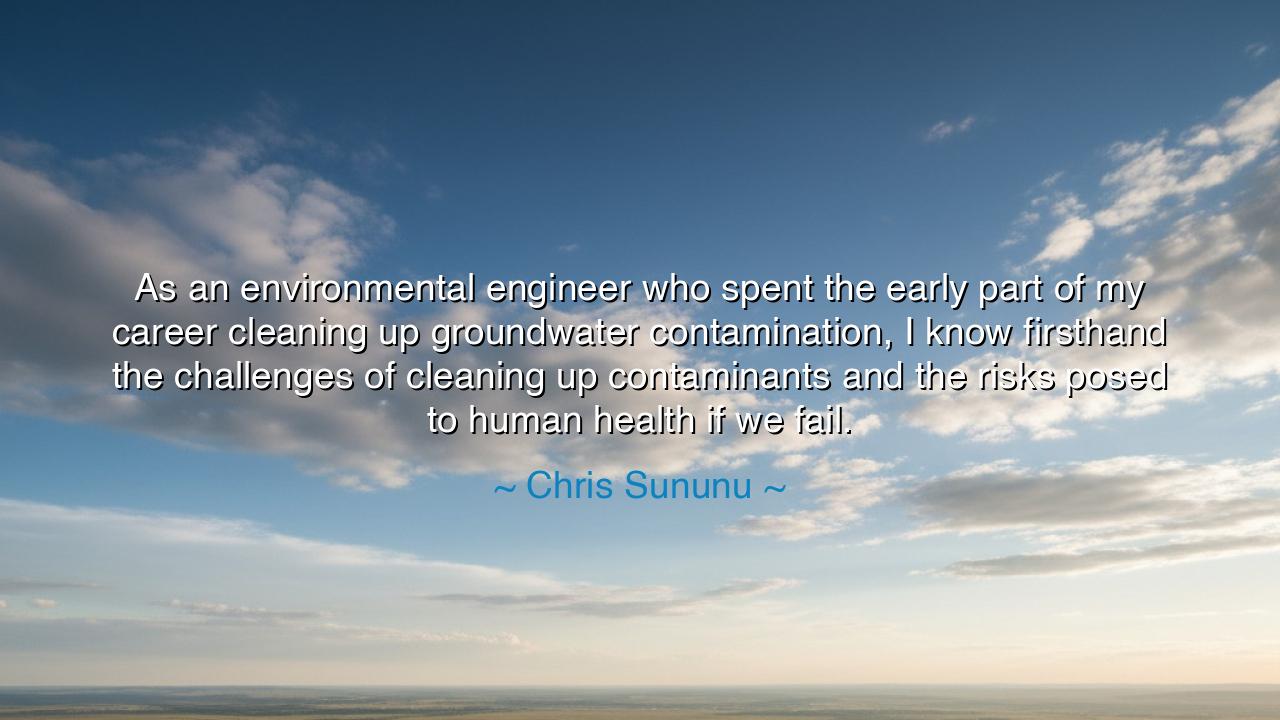
As an environmental engineer who spent the early part of my
As an environmental engineer who spent the early part of my career cleaning up groundwater contamination, I know firsthand the challenges of cleaning up contaminants and the risks posed to human health if we fail.






When Chris Sununu said, “As an environmental engineer who spent the early part of my career cleaning up groundwater contamination, I know firsthand the challenges of cleaning up contaminants and the risks posed to human health if we fail,” he spoke not only as a governor or an engineer, but as a steward of the Earth, one who has touched its wounded places with his own hands. His words are the voice of experience — the voice of one who has seen how human carelessness poisons the very veins of the planet, how groundwater, that unseen lifeblood beneath our feet, can carry both sustenance and sickness. In his reflection, we hear both the humility of labor and the gravity of warning: that the true measure of progress is not in what we build above the surface, but in how we protect what flows below.
The origin of this quote lies in Sununu’s early career as an environmental engineer, long before public office called him to leadership. In those years, he labored not in marble halls but in the field — examining soil, tracing plumes of contamination, and fighting invisible battles against chemicals that leach silently into the earth. His words are born of firsthand knowledge: that to clean the Earth is a sacred task, slow and exacting, yet vital to human survival. When he speaks of “challenges” and “risks,” he reminds us that the Earth’s wounds are not easily healed — and that the cost of failure is measured not in statistics, but in the health of our children, our rivers, our future.
In the spirit of the ancients, his reflection carries the wisdom of the old world’s engineers and philosophers — those who saw no separation between the laws of nature and the ethics of man. The Romans built their aqueducts with reverence, for they knew that clean water was the pulse of civilization. The ancient Persians guarded their qanats as sacred veins through which the desert itself could live. To pollute such waters was considered not only foolish but sinful — a betrayal of divine trust. Sununu’s words, though spoken in the modern tongue, echo this same truth: that the guardianship of water is the guardianship of life.
History is filled with reminders of what happens when this duty is forgotten. In the mid-20th century, the town of Love Canal in New York became a symbol of environmental tragedy. Buried beneath the ground were tons of industrial waste — forgotten, hidden, and then unleashed through the slow seep of rain. The children who played above it fell ill; the air thickened with chemicals; families fled from their homes. This is the vision Sununu warns against — not an abstract idea, but a real and recurring danger. For the Earth remembers everything we bury within her, and one day, she returns it to us.
But his message is not one of despair — it is one of responsibility and renewal. To acknowledge the risks is not to yield to them, but to rise with understanding. The engineer becomes the healer, and every act of cleanup, every barrier built to protect groundwater, becomes a gesture of penance and hope. In his tone, we hear not complaint but resolve — the conviction that though the work is hard, it is sacred, for it defends the invisible foundations of health and life itself.
There is also a deeper moral symbolism in his words. “Groundwater contamination” is not only a physical reality — it is a metaphor for the pollution of conscience. Just as toxins seep unseen through soil, so too do corruption, greed, and neglect seep through the hearts of humankind when left unchecked. And just as the Earth must be cleansed through patience and diligence, so must our inner world be purified through honesty and care. The work of the environmental engineer, then, is also the work of the moral soul: to restore purity where decay has spread, to defend life where indifference has taken root.
The lesson of Sununu’s reflection is therefore twofold. First, we must act — not in speeches, but in stewardship. Protect the waters that feed the land; guard the soil that cradles our food; remember that the health of the Earth is not separate from our own. And second, we must live by the same principle inwardly: cleanse what is corrupt in our own hearts, repair what has been damaged by neglect, and nurture what is still pure. For the future will not be saved by technology alone, but by the spirit that wields it with compassion and foresight.
So, to the generations yet to come, let this truth be passed down like scripture: to protect the Earth is to protect ourselves, and to neglect her is to poison our own well. The task may be slow, the labor unseen, but it is the noblest of duties. For in every drop of clean water, in every healed river, there echoes the legacy of those who chose to act — those who, like Sununu, faced the contamination of the world and said, “I will cleanse it.” And that, children of the Earth, is the work that keeps life eternal.






AAdministratorAdministrator
Welcome, honored guests. Please leave a comment, we will respond soon